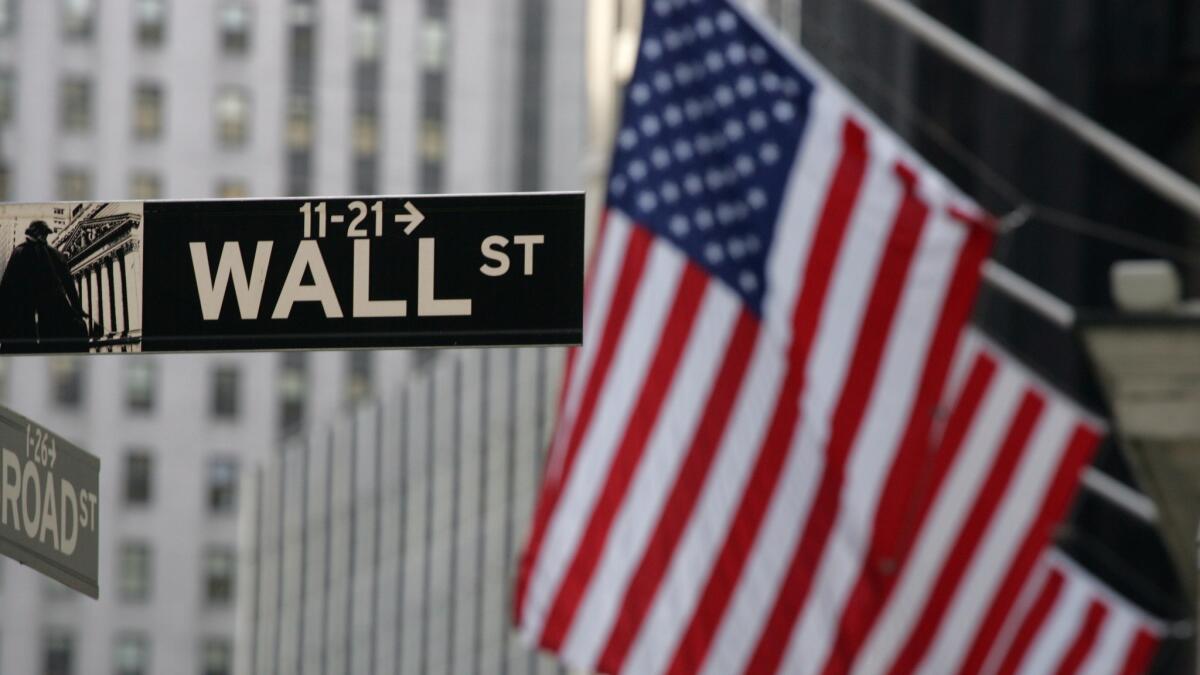Stocks inch higher, sending S&P 500 to another record

- Share via
Stocks ticked higher Monday as investors looked past this weekend’s failed coup attempt in Turkey and nudged the Standard & Poor’s 500 index to another record.
The S&P 500 rose 5.15 points, or 0.2%, to 2,166.89. It was the fifth time in the last six days that the index set a closing high. The Dow Jones industrial average rose 16.50, or 0.1%, to 18,533.05. The Nasdaq composite rose 26.19, or 0.5%, to 5,055.78.
The stock market has been on a mostly upward swing since February, notwithstanding a few setbacks, after shrugging off worries about fragile economies overseas, weaker profits at home and sundry other challenges. Add one more to the list: Friday’s military uprising in Turkey.
Currency traders had the first chance to react to the attempted coup, which caught investors’ attention after most stock markets were closed late Friday, and the initial reaction was one of fear. But by the time stock markets around the world opened for trading Monday, most reacted with a shrug, and the Turkish lira recovered some of its steep losses.
Technology stocks led the way, rising 0.7% after SoftBank Group agreed to buy British chip designer ARM Holdings for $32 billion. ARM’s U.S.-listed shares soared $19.09, or 40.6%, to $66.17.
Financial stocks gained after Bank of America reported earnings that were better than analysts were expecting. Banks have been struggling with low interest rates, which limit the profits they can earn from making loans.
Bank of America nevertheless reported a smaller decline in earnings than analysts forecast, due in part to higher trading revenue and cost cuts. Its stock rose 45 cents, or 3.3%, to $14.11.
The day atop the leaderboard for tech and bank stocks marks a turnaround from their performance earlier this year. Financial stocks are the only sector of the S&P 500’s 10 that are still down for 2016, while technology has made one of the smallest gains.
For much of the year, investors have flocked instead to industries seen as offering a steadier ride. These are also ones that tend to pay the biggest dividends. Telecom stocks are up 22.1%, versus the S&P 500’s 6% rise, for example.
Much of that demand likely came from investors seeking alternatives to bonds, which are paying only small amounts of interest. The Federal Reserve raised the target for its benchmark short-term interest rate in December for the first time since 2006, but economists have since been pushing out their predictions for when the next increase may occur.
The yield on the 10-year Treasury ticked higher Monday, to 1.58% from 1.55% late Friday.
Hasbro was the day’s worst-performing stock in the S&P 500, despite reporting better-than-expected quarterly earnings. It fell $5.68, or 6.6%, to $79.82 after it said revenue growth at its boys’ toy unit grew more slowly than analysts expected. The unit is Hasbro’s largest, accounting for 40% of its total revenue.
Netflix stock dropped sharply in after-hours trading after the video service said it added fewer subscribers last quarter than expected. The company blamed cancellations by subscribers facing price increases after a two-year rate freeze expired. The stock sank $16.50, or 16.7%, to $82.15 after-hours.
A slew of other companies are scheduled to report their quarterly earnings this week, including nearly a fifth of the S&P 500 index. Analysts have dim expectations, with forecasts for a fourth consecutive decline in earnings, according to S&P Global Market Intelligence.
Many investors will be paying more attention to what companies have to say about upcoming earnings trends than how they did during the spring. Analysts are expecting earnings for the S&P 500 to return to growth in the current quarter, and investors hope to hear CEOs say at least that conditions are improving, if not good.
Precious and industrial metals prices ended mixed. Gold rose $1.90 to $1,329.30 an ounce, silver lost 9 cents to $20.08 an ounce and copper edged up less than 1 cent to $2.24 a pound.
The price of crude oil fell 71 cents to settle at $45.24 per barrel. Brent fell 65 cents to $46.96 a barrel in London. Wholesale gasoline fell 3 cents to $1.39 a barrel, heating oil lost 2 cents to $1.38 a gallon and natural gas fell 3 cents to $2.72 per 1,000 cubic feet.
The dollar fell against many of its major rivals, except for the Japanese yen. The euro rose to $1.1068 from $1.1063, and the British pound rose to $1.3260 from $1.3206. The dollar rose to 106.12 yen from 105.53 yen.
UPDATES:
2:10 a.m.: This article has been updated after the close of markets.
7:45 a.m.: This article has been updated to reflect more recent market news.
This article was originally published at 6:50 a.m.
More to Read
Inside the business of entertainment
The Wide Shot brings you news, analysis and insights on everything from streaming wars to production — and what it all means for the future.
You may occasionally receive promotional content from the Los Angeles Times.










